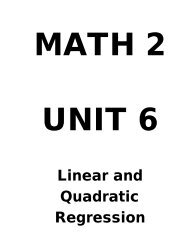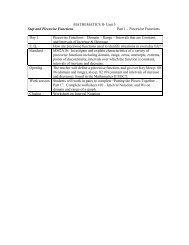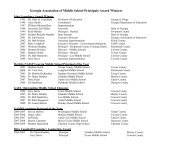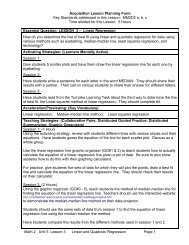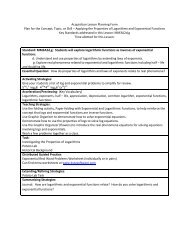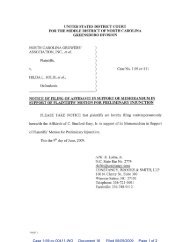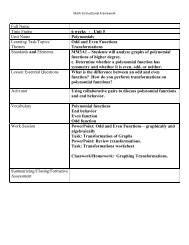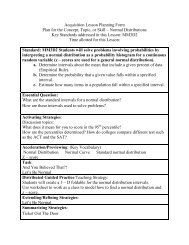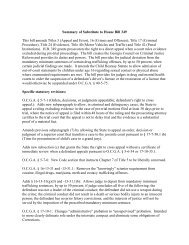State Action Plan Goals & Objectives - Ciclt.net
State Action Plan Goals & Objectives - Ciclt.net
State Action Plan Goals & Objectives - Ciclt.net
Create successful ePaper yourself
Turn your PDF publications into a flip-book with our unique Google optimized e-Paper software.
Divisons for Special Education Services & Supports<br />
Georgia Department of Education<br />
Agency/Program Information<br />
Mailing Address: 1870 TwinTowers East, 205 Jesse Hill Dr. Drive, SE<br />
Street Address: 1870 TwinTowers East, 205 Jesse Hill Dr. Drive, SE<br />
City/<strong>State</strong>/Zip: Atlanta, GA 30334 City/<strong>State</strong>/Zip: Atlanta, GA 30334<br />
Web: http://www.gadoe.org/<br />
To receive information on services or referrals please contact:<br />
Phone: (404) 656-3963<br />
Email: ggelinas@doe.k12.ga.us<br />
Agency/program description: The Georgia Department of Education, Divisions for Special Education Services and Supports strives to ensure that all children with disabilities in<br />
Georgia will participate in a challenging educational program designed to meet their unique needs that results in increased academic performance and prepares them for<br />
employment and independent living.<br />
Eligibility criteria: A child with a disability is a child evaluated and determined to be eligible for special education services for intellectual disabilities, a hearing impairment<br />
including deafness, a speech or language impairment, a visual impairment including blindness, emotional disturbance, an orthopedic impairment, autism, traumatic brain injury,<br />
other health impairment, a specific learning disability, or Deaf/blindness.<br />
Eligible age groups: A free, appropriate public education (FAPE) must be available to all children residing in the <strong>State</strong> between the ages of 3 and 21.<br />
Program is an entitlement program: Yes, if students meet eligibility requirements for special education.<br />
Services offered: A wide range of services may be offered as determined by the student's Individualized Education Program (IEP) team. Services must be documented in the<br />
student's IEP. Services may include, but not be limited to, specialized instruction, speech therapy, physical therapy, occupational therapy, transportation, audiological services,<br />
adapted physical education, and vision services.<br />
Funding or financial assistance offered: Students with disabilities are entitled to a "free, appropriate public education " (FAPE) under the Individuals with Disabilities Education<br />
Act (IDEA)<br />
Services for People with Brain Injury (BI) - Traumatic (TBI)* and Acquired (ABI)*<br />
People with brain injury eligible for services (note if there is a distinction between TBI and ABI): Yes. There is a specific designation for children with TBI, but there is not<br />
one for children with ABI. Children with ABI will be identified under other categories such as "Other Health Impairments."<br />
Agency definition of brain injury (note if there is a distinction between TBI and ABI): Traumatic Brain Injury (TBI) refers to an acquired injury to the brain caused by an<br />
external physical force, resulting in total or partial functional disability or psychosocial impairment, or both, that adversely affects the child's educational performance. The term<br />
applies to open or closed head injuries resulting in impairments which are immediate or delayed in one or more areas, such as cognition, language, memory, attention, reasoning,<br />
abstract thinking, judgment, problem solving, sensory, perceptual and motor abilities, psychosocial behavior, physical functions, speech and information processing. The term does<br />
not apply to brain injuries that are congenital or degenerative in nature, brain injuries induced by birth trauma. [34 C.F.R. § 300.8(c)(12)]<br />
Time period following injury that people referred to program: varies - usually centered around time for school re-entry<br />
Source of referrals to program: Referrals for special education are made to the child's local education agency following local procedures. Referrals may be initiated by<br />
educators, parents, hospitals, physicians and other parties involved with the child. Direct referrals for special education are not made to the Georgia Department of Education.<br />
Specialized services for people with TBI or ABI: Services and service delivery are determined by the student's IEP team. The identification of TBI for educational programming<br />
does not dictate a specific service or placement. The child with TBI shall be served by any appropriately certified teacher in any educational program, as specified in the child's<br />
individualized education program (IEP) Team minutes.<br />
Case management offered for people with TBI or ABI: The person responsible for the IEP is typically considered the "case manager".<br />
Agency personnel receive training on TBI or ABI Teachers may participate in available training focused on TBI.<br />
Services for People with Spinal Cord Injury (SCI)



